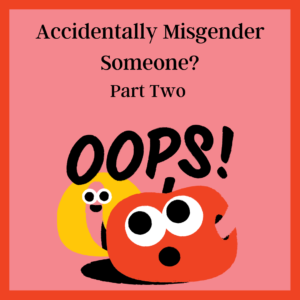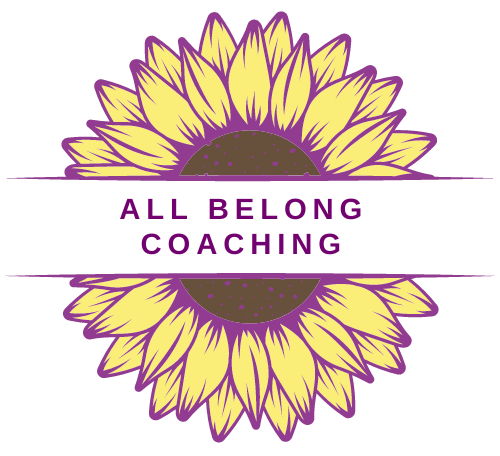
Accidentally Misgendering – Part Two
Hello Friends!
A little while ago, I posted some tips about what to do (and not do) if you accidentally misgender someone. My general advice when this happens is to apologize briefly, say thanks, and state it won’t happen again. As for things not to do, I advised against being overly effusive in your apology and I advised against asking a bunch of questions, making the person who was misgendered have to do additional emotional labor. After posting that, I had a few people contact me with very good questions – so here is my part two follow up!
In the original post, the advice I give is sound advice. But it isn’t one-size-fits-all. As with most situations, there are exceptions. Is it ever appropriate to ask questions? Sure. But read the room. If you accidentally misgender someone you care about, you definitely may have questions. And sometimes it is okay to ask questions. Often it depends on your personal relationship (or lack thereof) with the person. Sometimes it depends on what’s going on at the time. *Most* people I know, will not be offended by a question asked respectfully. I think it’s about respect and consent.
Some questions that I received were asking me about how a person can learn if they can’t ask questions. That’s a fair question. As I said above, I think it’s about reading the room and getting a person’s consent. Here’s an example I can use for myself. Recently, someone told me that their pronouns were she and they. First, I said, “thanks for sharing, I use she/her pronouns.” But I did have a question. I later on politely asked her, “Would it be okay if I ask you a question about your pronouns?” She said it was and then I asked my question, which was, “If you use different pronouns like she and they, do you have a preference about which one a person uses?” Their response to me was something like, “thanks for asking – it makes me feel good when people use both – so sometimes say she and sometimes they.” And I thanked her answer my question and went on about my day. I did not mean to imply in my first post that it’s never okay to ask questions – especially to someone you care about. If the person had said to me, “no I don’t want to answer questions about my pronouns.” or “yes but not now” – I would have respected that. She didn’t owe me any answers.
Another question I got was – rather than mess up, would it be offensive if I just use “they” for everyone? I actually don’t know the answer to this. My guess would be that some people will be offended and others won’t. Some people are very attached to their gender and/or their pronouns. Others not so much. As a rule, if I don’t KNOW someone’s gender (not guess based on how they look but actually know) I will often use “they” until I’m corrected or learn otherwise. When it comes to strangers I think this has actually been positive. It shows folks that I’m aware that gender and gender expression are not always the same, and I think that’s helpful in a world full of all the heteronormativity. So for me, I would rather someone default to “they” than to assume one gender or another. BUT – I’m 100% certain that not everyone feels that way. I guess my general advice would be – it’s okay to use “they” until someone tells you what their pronouns are. Then I’d advise trying really hard to use the pronouns the person identifies.
Many, many folks when learning about new respectful language (whether it be about race, sexuality, gender, etc) really want to NOT mess up. Sometimes the person who is very well-meaning gets so nervous about offending someone that they pull back from getting to know the people they want to be allies to so as not to offend them. I’ve seen this happen lots – in all kinds of marginalized communities. People want to help but are so unsure and want so much not to offend anyone that instead of being allies, they hang back. So how do we teach without scaring potential allies away? There’s no easy answer for this one I’m afraid. I’m a queer white cisgender chick. I can talk about those identities and intersections but there are so many other more marginalized communities than mine. I’m not trans or BIPOC, for example. So I worry too. I don’t want to offend anyone. I don’t want to make anyone do emotional labor for me. I want to be respectful but sometimes I am not sure how. So what I try to do is be willing to be uncomfortable. Be humble if I screw up and accept that I may have hurt someone. Even if I didn’t mean to. Find someone I think I *can* talk to and ask questions of, and do so in positive ways. I can do my own research and surround myself with media that is filled with images and sounds from the community I want to learn more about. I can accept the fact that I’m GOING to screw up. And I try each day to know a little more than I knew the day before.
So the advanced lesson really is – read the room. Act with love. Ask forgiveness. Do better today than yesterday.
Until next time friends!
Love,
Kat

